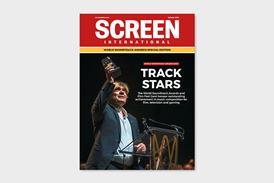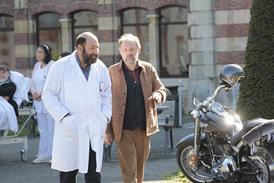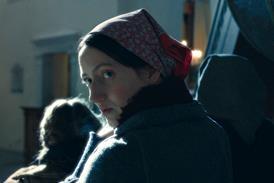Costa-Gravas deals with death in this wordy philosophical drama

Dir. Costa-Gavras. France. 2024. 110 mins
It’s hardly a surprise that a film about death might come across as somewhat lugubrious, but The Last Breath – a meditation on healthcare and mortality from veteran director Costa-Gavras – might perhaps have breathed a little more lightly. Based on a book by philosopher Régis Debray and palliative care specialist Claude Grange, the film dramatises a range of questions about physical vulnerability, death and ways to confront the human condition; but from the start, it comes across more like a soberly dramatised seminar than as an emotionally evolving fiction.
More like a soberly dramatised seminar than an emotionally evolving fiction
Denis Podalydès and Kad Merad, essentially playing versions of Debray and Grange, offer thoughtful solidity at the head of an illustrious cast that includes Angela Molina, Charlotte Rampling, Hiam Abbass and Karin Viard. But despite authoritative performances, the film never really comes alive. It may be thought-provoking in its content, but is more likely to find its niche as an educational tool than as a cinematic proposition.
French screen regular Podalydès – as so often, embodying the average worried man – plays eminent philosopher Fabrice Toussaint, first seen having an MRI scan in Boston, with concerning results. Back in France, he has another check, and meets Dr Augustin Masset (Merad), a specialist in palliative healthcare. Knowing that Toussaint is interested in end-of-life questions – he has a book on the theme, about to be republished – Masset proposes giving him a tour of his hospital, letting him sit in on meetings and recounting assorted anecdotes about his experience with cancer patients and the imminence of death.
Among the embedded stories are episodes involving a wealthy woman (Charlotte Rampling) determined to take control of her demise; a young woman (Agathe Bonitzer) raging against her condition; and a patient (Nouvelle Vague stalwart Alain Libolt, a peppery standout) and his wife (Hiam Abbass), both in a state of furious denial. A particularly impressive performance comes from Françoise Lebrun, also notable in another recent death-musing drama, Gaspar Noé’s Vortex; here she plays a reconciled patient, who enjoys a conversation with Toussaint about different religious versions of the afterlife.
A more boisterous episode features Angela Molina as a woman who arrives in hospital with her large Romany family and accompanying jazz musicians. Merad – who recently appeared in another veteran director’s musing on mortality, Finally by Claude Lelouch – contributes reassuringly bearlike gravitas as the pensive, ethically grounded medic.
Despite attempts at dramatisation – sometimes lively, more often downright dogged – the film comes off as an earnest talkathon, its dialogue spiked with philosophical and literary references (Houellebecq, Lacan, François Mauriac et al), not to mention theological allusions to notions like metempsychosis and palingenesis. One scene in particular, in which Toussaint and a circle of media types discuss a possible TV programme on the theme, is especially laborious, and the overemphasis on his status as an instantly recognisable celebrity thinker is a wearing mannerism.
Costa-Gavras made his reputation as master of the political thriller with films such as Z and State Of Siege but, while he sustains a note of thoughtful seriousness throughout, there’s little dramatic urgency here. Nevertheless, the heavyweight content in itself is likely to prompt viewers to speculate on their own preferred version of a ‘good death’ – although most of us would probably prefer not to go out accompanied by a twee children’s song about snails.
Production company: KG Productions
International sales: Playtime, joris@playtime.group
Producers: Michèle Ray-Gravas, Alexandre Gavras
Screenplay: Costa-Gavras, based on the book by Claude Grange and Régis Debray
Cinematography: Nathalie Durand
Production design: Catherine Werner Schmit
Editing: Costa-Gavras, Loanne Trevisan
Music: Armand Amar
Main cast: Denis Podalydès, Kad Merad, Marilyne Canto, Angela Molina, Charlotte Rampling, Hiam Abbass, Alain Libolt, Agathe Bonitzer
























